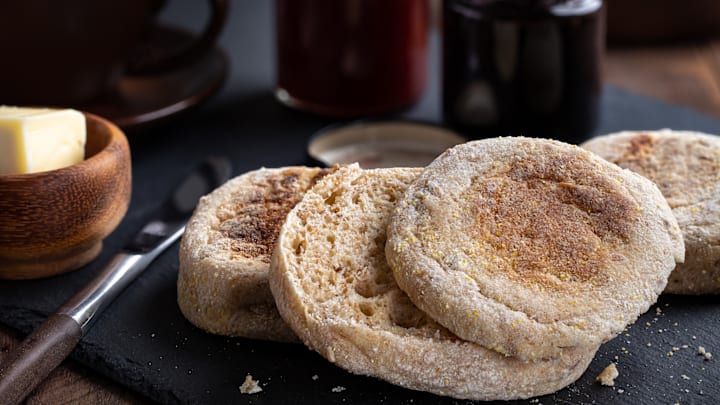When you want to take a break from bread but a bagel seems too radical a departure, there’s always the English muffin—a relatively light carb option that prominent baker Thomas’ often portrays as having “nooks and crannies” for taste and texture.
But is the English muffin actually English? Not really, though that answer really depends on how you feel about ex-pats.
According to Kitchn, the English muffin was the work of Samuel Bath Thomas, a Brit who immigrated to New York City from Plymouth in 1874. As a baker, he whipped up what he dubbed a toaster crumpet, which soon became the toast (apologies) of the city’s breakfast scene.
A toaster crumpet is a variation on a standard crumpet, which uses baking soda to help aerate the flour and create holes on the outside. Thomas modified it by removing the baking soda so the holes were inside. Using lots of water and griddle-baking on high heat, the water quickly evaporates and leaves air pockets. Once separated, the muffin can “grab” on to spreads like peanut butter or jelly. Basically, Thomas created an 1800s version of a cronut—a new spin on a popular staple.
And yes, Thomas’ English muffins refer to Samuel Bath Thomas, who wound up building a muffin empire. Demand for his muffins grew to the point where he was making deliveries with a horse wagon and later opened multiple bakeries to handle the demand. When he died in 1919, his daughters took over the family business, incorporating it in 1922. It was later sold to CPC International in 1970.
Much like the recipes to Coca-Cola and Kentucky Fried Chicken, the formula for the muffins are a closely kept secret within the company. Just seven people within Bimbo Bakeries, the current parent company of Thomas’, know each and every step, from the right amount of moisture to the baking equipment used. When one high-level Bimbo executive defected to Hostess in 2010, Bimbo sued to stop his hiring, fearing he might reveal key muffin intelligence.
While the recipe is worth guarding, is it “English”? The English muffin is derived from British toaster crumpets, though their innovator was living in New York City and distributing them stateside. It's food for thought while you're grabbing another muffin.
[h/t Kitchn]
